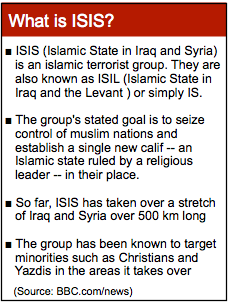200,000 flee Syria from ISIS attacks
As of Monday, September 22, an estimated 200,000 people have fled the Kurdish town of Kobane, Syria, within the span of four days. The people fear the Islamic State militants advancing on their hometown.
Many of the refugees headed for Turkey, who on Friday opened up a 30 km (19 mile) stretch of its border. Since then, as many as 130,000 have been allowed entrance, the Turkish Prime Minister said.
But the sudden influx of people into Turkey has slowed, as on Monday the number of open border posts decreased from 9 to just 2, according to U.N. refugee agency, UNHCR.
According to CNN reporters Ben Brumfield, Josh Levs and Gul Tuysuz, the process of processing people entrance is slow. Any hoping to enter the country must first be identified, searched for weapons, undergo a medical che ck, and receive an ID card for the benefit of local authorities.
ck, and receive an ID card for the benefit of local authorities.
For those who were able to enter Turkey, living conditions have been difficult. Many fled their homes in such a haste they had no time to even take clothes with them, Hanan, a Kurdish refugee, told BBC News. “People were left without shelter, or any help,” Hanan said. “They have been sleeping in the streets, in parks and mosques.”
Some refugees expressed the desire to go back to Syria, but found leaving no longer an option. “Now they’ve closed the border. After clashes with Turkish forces, they’re not allowing anyone to go back,” Hanan said.
Clashes broke out on Sunday between border agents and Kurdish people trying to return to Syria to help defend Kobane. According to BBC reporter Mark Lowen, border agents tried to prevent the refugees from leaving, and eventually resorted to pushing them back with tear gas and a water cannon as the conflict heated up.
Turkey’s worry, according to Lowen, was that the Kurds would join up with the Kurdish militia in Syria and eventually start launching attacks on ISIS from turkish soil. They fear the repercussions of such a course of action.
Even so, a number of Kurdish people had already returned to fight. According to Idris Nassan, the Kurdish official in Syria, their aid is helping. “Over the last two days, YPG has been making progress,” Nassan said. “Before that, ISIS was advancing, and YPG was retreating, but the situation has changed now, and the YPG is making a strong response.”
As of October 8, Chobani Greek yogurt CEO Hamdi Ulukaya, a Turkish native now living in the U.S., pledged to donate $2 million to help Kobane refugees. “Either we will be watching the massacre there and will live on with a guilty conscience or we will save people,” he told the Hurriyet Daily News.
The 42 year-old businessman stated that the money will go to nongovernmental organizations in the area, but it is not yet clear which ones. “We’re talking to everybody active on the ground,” he told the Hurriyet. “All applications will be evaluated throughout October.





